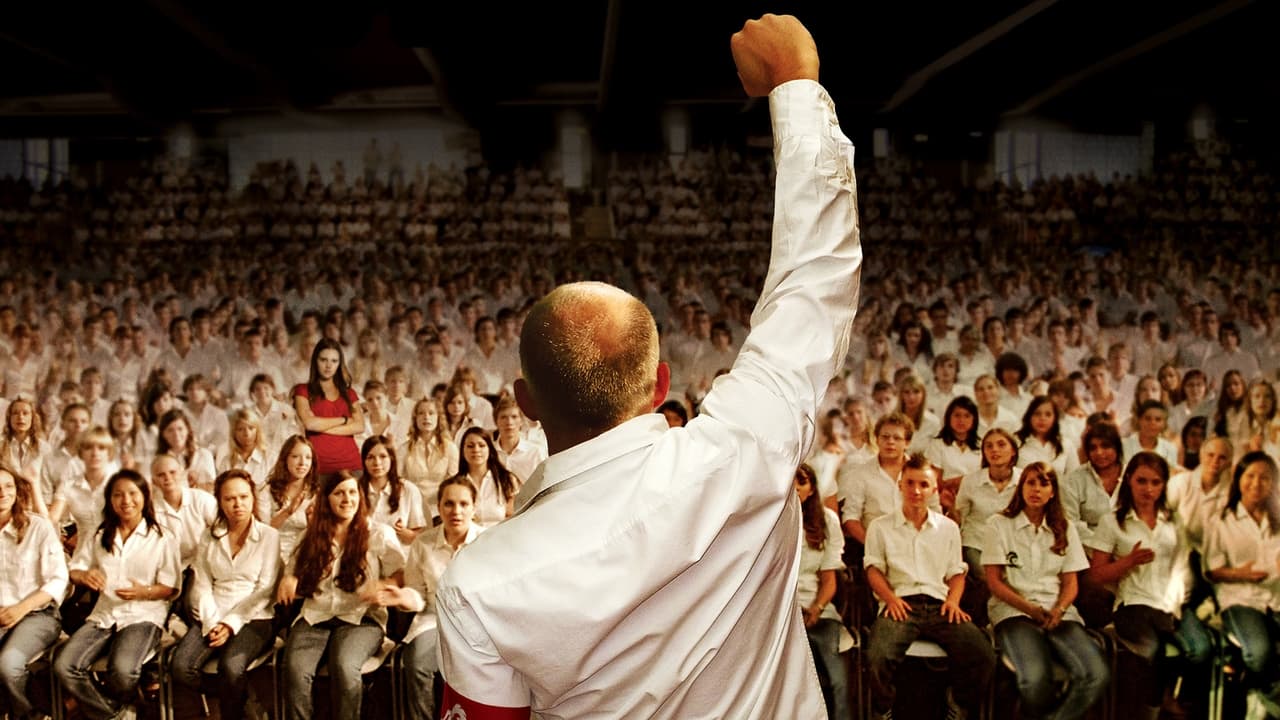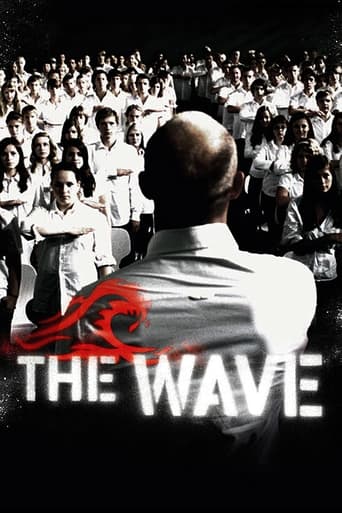

People are voting emotionally.
... View MoreA Disappointing Continuation
... View MoreI saw this movie before reading any reviews, and I thought it was very funny. I was very surprised to see the overwhelmingly negative reviews this film received from critics.
... View MoreIt is encouraging that the film ends so strongly.Otherwise, it wouldn't have been a particularly memorable film
... View MoreIf you ever faced the crowd you know how it feels being in control, being heard, being significant. But you might not get from the very beginning that this power comes with corresponding responsibility. Not only for the knowledge of the group, skills or proper understanding, but for the behavior, and ultimately - for their lives. Even clear and presumably right intention can lead to an unpredictable result.Which happened to Rainer Wenger (Jürgen Vogel), high-school teacher assigned with an ordinary theme for project – autocracy, who decided to launch a week-long play, inviting class to implement basic dictatorship principals. Brilliant play of Frederick Lau (as Tim), Max Riemelt (as Marco) and Jennifer Ulrich (as Karo) unfolds several scenarios people can perceive and react to new environment.This film sends clear message thereby serving as a manual and reminder for teachers – evaluate risks and keep your eyes on the ball. Always.
... View MoreThe Wave is a German foreign language film in the drama genre. It's Lord of the Flies meets The Stanford Prison Project. If you like foreign films for the nonformulaic content, this one is for you. The Wave is a must see for anyone interested in social studies, leadership, teaching, Nazism, or group psychology. It's a didactic cautionary tale. The plot follows Rainer Wenger, the "cool teacher" at a modern German high school. Contrary to his rock 'n' roll, anarchist beliefs, he is assigned to teach a class on autocracy. The teacher uses the project to turn the classroom into a social experiment. Along with the natural momentum of the crowd, "Herr Wenger" forms and leads a "movement," by organizing the students into a single unit with militant discipline. What follows is a transformation of the students as they galvanize around the group mentality, sense of purpose, unity, belonging, structure, and mob mentality. They radically shift their personalities and become inspired. It's a study in groupthink versus individualism. In all fairness, it's not a suspense film. The Wave features a large cast of well-developed characters. The acting was on point and you could see the fruits of the direction. Once again Europe proves that you don't need a fortune to produce quality entertainment. As an aside, Lord of the Flies was written by William Golding, a Jew, as a commentary on the potential for the average person to get swept up in Nazism. As with Jewish social scientists Maslow and Milgram, they wanted to demonstrate that the Nazi menace could happen anywhere and was not exclusive to Germany because of a cultural predisposition to authoritarianism. Golding was also British and he wanted to challenge the notion of English cultural superiority. Ironically, the Nazis at first lambasted psychology as the "Jewish medicine." Indeed, Freud and his disciples were Jewish, reflecting an historical interest in the subject dating back to Joseph, the biblical Israelite patriarch and dream interpreter. The psychoanalytic school had a token, "Aryan" Carl Gustav Jung. Jung started out as a student and close friend of Freud. They broke over philosophical and personal differences. Jung, with his theory of the "Collective Unconscious," specialized in organizational psychology. When the Nazis took over, most of the top psychologists fled Germany because they were either Jews or friends with Jews. They saw the writing on the wall and were too intelligent to go along with the program. Ever the devoted German, Jung remained, with fateful consequences.Hitler and Goebbles did an aboutface and realized the validity of psychology. Jung was recruited into the Nazi Party and became their top psychologist. He worked hand-in-hand with Propaganda Minister Goebbles in the Ministry of Information. The "Collective Unconscious" quickly became the "Racial Unconscious." Jung had a direct and responsible hand in designing Nazi rallies, for maximum impact. For example, there were torches used as decoration, the thinking being that it would inspire the rank-and-file by hearkening back to pagan roots--unconsciously. Some people believe Jung's betrayal of humanity was motivated by a personal betrayal of Freud. He fell victim to his own programming. In one scene, Herr Wenger is seen wearing a T-shirt with the name Marie Curie depicted. Curie was the French scientist who discovered radium and later died from its poisoning. Wenger's character arc follows a similar path, not unlike the classic German fairytale of Frankenstein's Monster. In the '80s, the Americans made a similar film to this one, but it drew the characters in stark contrast rather than shades of grey. The Wave had many subtleties and complexities to it. The psychological phenomenon of the "lone gunman" is broached. There is criticism of the Left, as well as the Right. In one scene, the hippie character urges a school newspaper editor to manufacture news to the detriment of The Wave, because "the end justifies the means," echoing voices on the American Far Left. The Nazis were big believers in the ends justifying the means. As long as people hold fast to the notion, they can become capable of anything. The Wave illustrates this point beautifully. It's meaningful edutainment.
... View MoreMore than a great movie, the Wave is a great story. Although it is based on real events, I did my homework and the story of the movie is much older that the film would make you think. It is based on an experiment conducted in 1967 by an American teacher who wanted to demonstrate how easily a movement similar to the Nazis could get ignited again. The movie is socially magnificent. It shows you how a group works and functions in unity under certain circumstances, and how easily individuals lose their ability to think outside the boundaries set by the group they have formed themselves. What I enjoyed is the fact that there was tension throughout, and you kept asking yourself how far would the group go and when the teacher who started it would find himself unable to control the force of the Wave. The Wave may not be the best movie you'll ever see, but it's well worth a watch.
... View MoreIt was on national television last night. I was curious to see it after a brief description on the net. And it was good.It says that it is based on the true story. I don't know how much of it really did happen, but the premise of the new group calling themselves 'The Wave' which is made of high school students is pretty interesting and who develop from a class experiment to a movement in just 3 days... Whoa! This is something that I don't really believe can happen. It may maybe in the course of 3 weeks... The acting of all teenagers was good. I guess the main male role is good too. The notion of new fascism or totalitarianism is kinda scary and it was a bit uncomfortable to see how people react when they are in a mob or a group. It is something that scares me personally. I give this movie a note 8. I have seen some other experiment type of movies with students, but this one is the best - from what I remember.
... View More